
Salvia hispanica, commonly known as chia, is a species of flowering plant in the mint family, Lamiaceae, native to central and southern Mexico and Guatemala. It is considered a pseudocereal, cultivated for its edible, hydrophilic chia seed, grown and commonly used as food in several countries of western South America, western Mexico, and the southwestern United States.

Halspiviridae is a family of viruses that consists of a single genus, Salterprovirus, which consists of a single recognised species; Salterprovirus His1. This virus was isolated from hypersaline water in Australia and was able to be cultured on the halophilic archaeon Haloarcula hispanica. Like many other archaeoviruses, His1 has an approximately limoniform (lemon-shaped) virion.
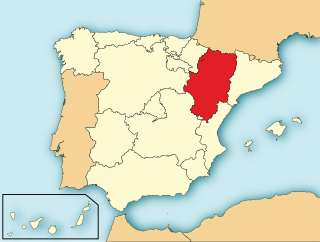
Psilocybe hispanica is a species of fungus in the family Hymenogastraceae. It produces small brown mushrooms with conical to convex caps up to 10 mm (0.4 in) in diameter and stems 16 to 25 mm long by 0.5 to 1 mm thick. Reported as new to science in 2000, it is only known from the Pyrenees mountain range in northern Spain and southwestern France, where it grows on horse dung in grass fields at elevations of 1,700 to 2,300 m. The mushroom contains the psychoactive compound psilocybin. The possible depiction of this species in the 6,000-year-old Selva Pascuala rock art suggests that it might have been used in ancient religious rituals—the oldest evidence of such usage in prehistoric Europe.
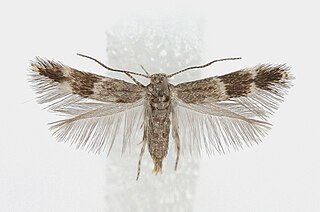
Elachista exactella is a moth of the family Elachistidae. It is found from the Iberian Peninsula, east to Romania, north through France and the Benelux to Fennoscandia, east through central Europe to the Baltic region and northern Russia.

Elachista tengstromi is a moth of the family Elachistidae found in Europe and Japan. The moth was formerly considered to be a form of Elachista regificella.
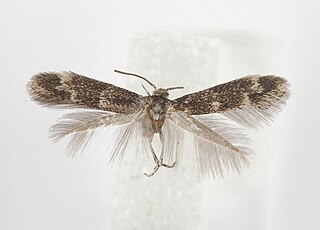
Elachista zernyi is a moth of the family Elachistidae that is found in Fennoscandia, Germany, Austria, Switzerland and Italy. It is also found in North America.

Elachista is a genus of gelechioid moths described by Georg Friedrich Treitschke in 1833. It is the type genus of the grass-miner moth family (Elachistidae). This family is sometimes circumscribed very loosely, including for example the Agonoxenidae and Ethmiidae which seem to be quite distinct among the Gelechioidea, as well as other lineages which are widely held to be closer to Oecophora than to Elachista and are thus placed in the concealer moth family Oecophoridae here.
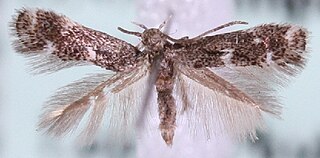
Elachista tetragonella is a moth of the family Elachistidae. It is found from Fennoscandia to Spain and Italy and from France to Bulgaria.

Elachista rudectella is a moth of the family Elachistidae. It is found from Germany to Italy, Greece and Romania. It is also found in Russia.

Elachista pigerella is a moth of the family Elachistidae. It is found from Germany to the Iberian Peninsula, Sardinia and Italy. It is also found in Russia and on Cyprus.

Elachista juliensis is a moth of the family Elachistidae that is found from Germany to Italy and from Switzerland to Slovakia and Hungary.

Elachista herrichii is a moth of the family Elachistidae. It is found from the Baltic region to the Pyrenees, Italy and Romania.
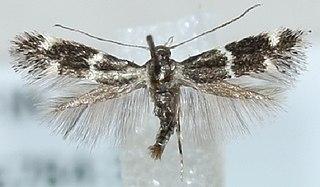
Elachista elegans is a moth of the family Elachistidae. It is found from Fennoscandia to Italy, Hungary and the Crimea and from Germany to Russia.

Elachista dispilella is a moth of the family Elachistidae. It is found from Fennoscandia to the Pyrenees and Italy and from France to Romania.

Elachista diederichsiella is a moth of the family Elachistidae. It is found from Fennoscandia and northern Russia to the Pyrenees, Alps and Carpathian Mountains, and from France to central Russia. It is also found in North America.

Elachista contaminatella is a moth of the family Elachistidae that is found from France, Austria and Slovakia to the Iberian Peninsula, Sardinia and Sicily. It is also found in Bulgaria and Russia.

Elachista chrysodesmella is a moth of the family Elachistidae. It is found from Sweden to the Iberian Peninsula, Italy and Romania and from France to Russia and Ukraine.
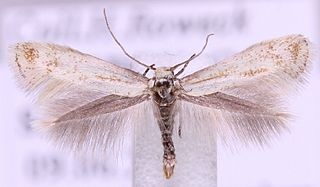
Elachista anserinella is a moth of the family Elachistidae. It is found from Scandinavia and the Baltic region to the Pyrenees, Italy and Greece and from France to Russia.
Alphasphaerolipovirus is a genus of double stranded DNA viruses that infect haloarchaea. The genus contains four species.

















